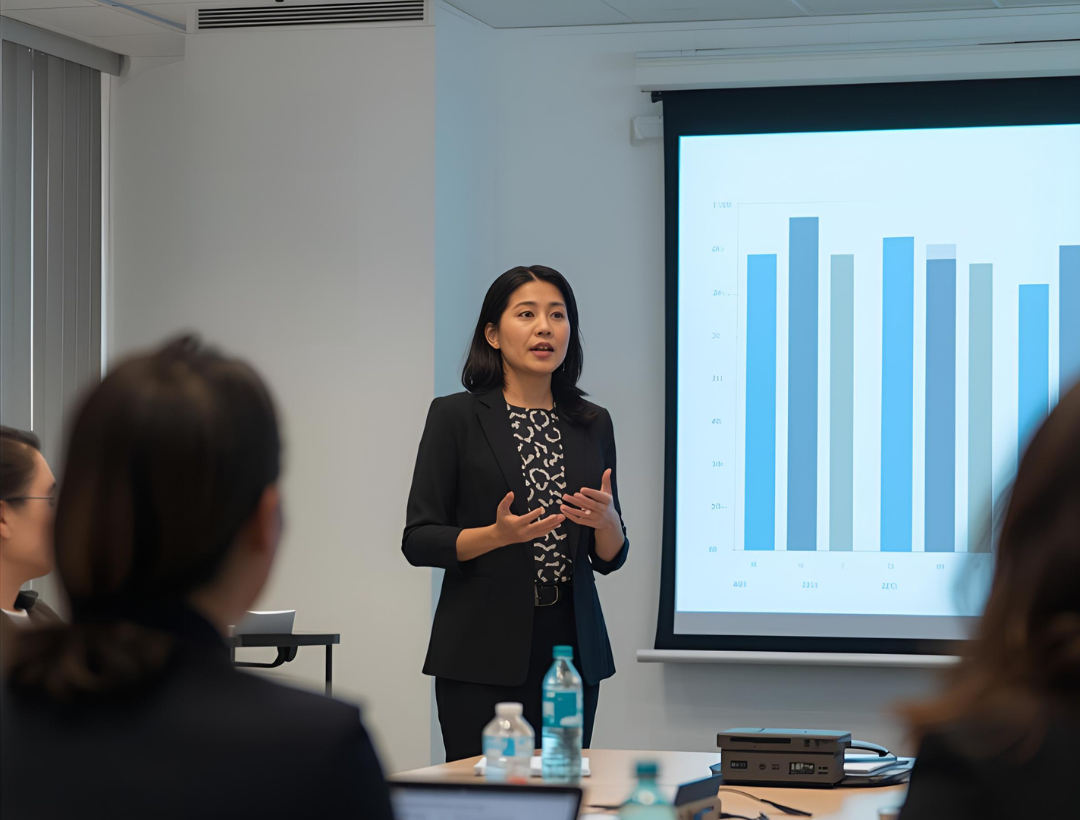actualites
You can’t be what you can’t see: Why role models matter for women in STEM and Finance — by Laure Koenig Matsoukis

We often hear that there are “too few women in STEM or finance,” as if it were one big decision point, a single moment where women drop out. But it’s not one moment. It’s a series of invisible barriers that appear at different stages: the first at school, another when entering the workforce, and a third when trying to reach leadership.
According to UNESCO, women make up only 35% of STEM students worldwide and about one in three researchers. In finance, the pattern is similar: only 22% of leadership roles globally are held by women (Deloitte, 2023). These numbers don’t reflect a lack of talent, they reflect a lack of visibility. And that invisibility is precisely what feeds doubt, limits ambition, and slows progress.
I’ve walked through all three barriers myself. I studied mathematics and physics before joining a top-ranked business school, then went on to earn a PhD in Finance. I built a career in corporate finance surrounded by men, before realizing that to truly lead, I had to create my own model, one that reflected who I was.
Each of those steps taught me something essential about what it takes not just for women to succeed but for organizations and societies to evolve.
Barrier 1: When curiosity meets doubt
My story with numbers started early. I was fascinated by logic, by the beauty of solving something that finally made sense. So naturally, I studied mathematics and physics, and later specialized in finance. But something was missing: someone, actually. During all those years, I never once had a female teacher in math, physics, chemistry, or finance. Not one. That absence planted a quiet doubt. I had wonderful mentors, mostly men, who believed in me and treated me like any other promising student. But confidence built only on other people’s belief in you can be fragile.
When I looked around and saw no women teaching or leading in these fields, I began to wonder whether I really belonged. That’s what I later understood as imposter syndrome: the silent question, “Do I deserve to be here?”
If we want more girls to choose data, science, or finance, we need to make belonging visible early. Not just by saying “you can do it,” but by showing them real faces, real paths, and real careers. And men have a huge role to play. The teachers who encouraged me, the mentors who listened to my ideas: they were men. They didn’t treat me as “the woman in the room.” They treated me as someone capable. That’s what true allyship looks like.
Takeaway: Don’t wait for permission to belong: take your seat at the table, even if you’re the first one there. You don’t need to see someone like you to start; sometimes you are the proof that it’s possible.
Barrier 2: Finding your place in a world not built for you
When I graduated, I entered the world of corporate finance consulting: large firms where excellence was expected, but where leadership models often felt designed by and for men. Even the recruitment process rewarded a certain kind of confidence: loud, assertive, traditionally masculine. I was often the only woman in the room, and I felt it. No one told me I didn’t belong, but I could feel the code: you had to speak fast, speak loud, and never doubt yourself out loud.
I learned how to hold my space, but I also saw how women’s ambition was judged differently. When a woman was promoted, there was always a story: she was lucky, well-connected, or she had sacrificed too much. No one said those things about men. Those quiet stories make you doubt not your talent, but your right to be ambitious. Across Europe, women still make up only 18% of executive committee members in financial institutions (European Banking Authority, 2023).
What helped me move forward were male allies who trusted me with big, complex projects not to “help a woman succeed,” but because they believed I could deliver. They didn’t protect me; they included me. That’s real inclusion: not deciding who gets to belong, but making space for everyone’s excellence to emerge.
Takeaway: When someone opens a door for you, walk through it and hold it open for others with even more confidence than you entered.
Barrier 3: Creating my own model of leadership
After several years in corporate finance consulting, I realized I wanted more meaning. I wanted to understand finance more deeply and maybe, if I’m honest, prove that I was as capable as everyone else. That led me to pursue a PhD in Finance. Looking back, I can see that my decision was partly driven by imposter syndrome, that voice that says, “You need to do more to be enough.” It never fully disappears, but I’ve learned to see it differently. It keeps me humble, curious, and human. That mindset guided me when I moved into academia, and later when I became an entrepreneur. I founded my own company to help leaders and entrepreneurs build financial clarity and strategic confidence.
For the first time, I was leading on my own terms. I didn’t need to copy the masculine leadership styles I’d seen before. I could lead with empathy, calm, and clarity, and still be strong. Leadership isn’t about fitting in. It’s about aligning who you are with what you bring.
Takeaway: My success didn’t come from following traditional rules of leadership: it came from rewriting them. Don’t chase the version of success that was built for someone else. Define your own, and lead from there.
Becoming the role model you once needed
If you don’t see a role model who looks like you yet, be that role model. Be visible. Ask the question no one dares to ask. Take the seat, even if no one saved it for you. You belong in the room not because you have something to prove, but because you have something to bring.
True strength doesn’t come from fitting into someone else’s model of success.
It comes from creating your own: one that reflects your voice, your values, and your way of thinking. The world doesn’t need more women who lead like men. It needs more women who redefine what leadership looks like: grounded in authenticity, empathy, and clarity.
But even the most determined women shouldn’t have to walk this path alone.
Representation opens doors, but community keeps them open. We rise faster and stronger when others walk beside us: mentors, peers, and allies who remind us that we belong long before we fully believe it ourselves.
My own journey was shaped by people, especially men, who trusted me with opportunities, believed in my abilities, and saw me simply as a professional.
That’s what allyship really is: not a campaign or a quota, but a mindset.
It’s when a manager says, “She should present this, she did the analysis.”
It’s when a colleague gives credit in front of a client.
It’s when a professor tells a young woman, “You belong here.”
If I could leave one message to young women and to those who teach, hire, or lead them, it would be this:
Don’t ask women to be exceptional to belong in finance or STEM.
Ask institutions to make belonging ordinary.
True equality begins when women no longer have to be exceptional to be accepted.
Every time a woman stands in a classroom, a boardroom, or a lab as herself, she widens the path for others.
And every time a man opens that space, he helps reshape the system for good.
Sources:
UNESCO. Global education monitoring report 2024, gender report - https://unesdoc.unesco.org/ark:/48223/pf0000389406
European Banking Authority. Report on diversity practices and the gender pay gap at the level of the management body. March 7 2023. https://www.eba.europa.eu/publications-and-media/press-releases/womens-representation-boards-has-gradually-improved-imbalances-remain
Deloitte, Women in the Financial Services Industry 2023. https://www.deloitte.com/us/en/insights/industry/financial-services/women-leaders-financial-services.html
This article was written by Dr. Laure (Koenig) Matsoukis, Professor of Finance at Albert School and founder of LMK Training and Koenig Financial Education. Recognized as a Top Voice in Finance in Switzerland, she brings her international expertise in financial strategy and business growth to our students.
At Albert School, we believe that change starts in the classromm. If you are an ambitious female student looking to build a career in finance, we invite you to explore our programs here.
Hear from our students about their amazing journeys and achievements

At Albert School, the student council fosters community and learning through events. By bringing students together, we enhance campus life and create connections, contributing to develop new soft skills.
Sulian
Bachelor in Business, Data, & AI
Bachelor Business, Data, & AI
Paris

What I like best about Albert School is how the professors foster our ambition and encourage us to have an entrepreneurial mindset!
Prisca
International BBA Business, Data, & AI - General Secretary of the Student Council
International BBA Business, Data, & AI
.png)
“The Business Deep Dives pushed me to grow beyond what I thought possible—turning lessons into real-world experience alongside inspiring companies.”
Samuel
International BBA Business, Data, & AI - Samuel, Student from Rwanda
International BBA Business, Data, & AI
